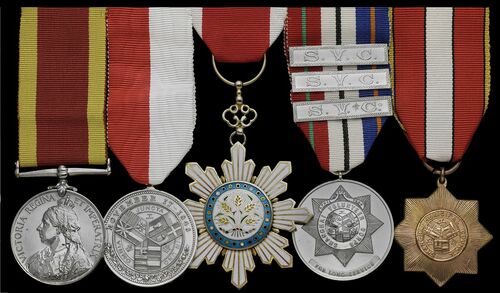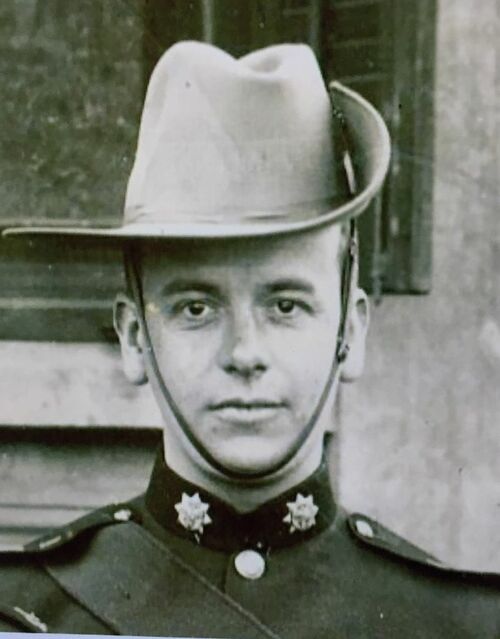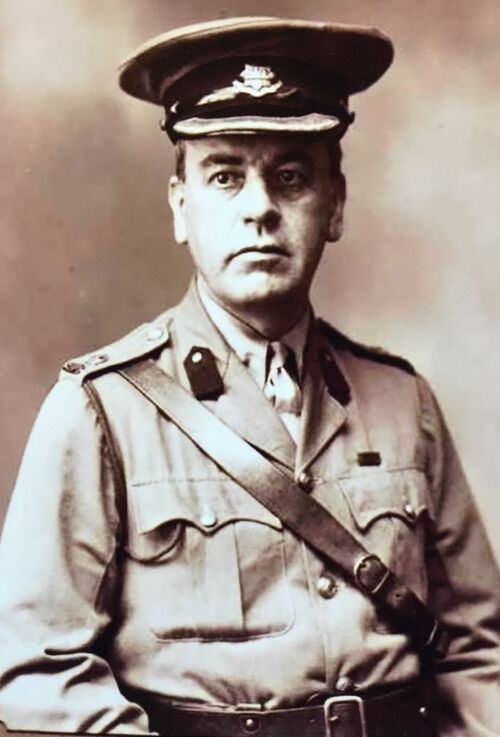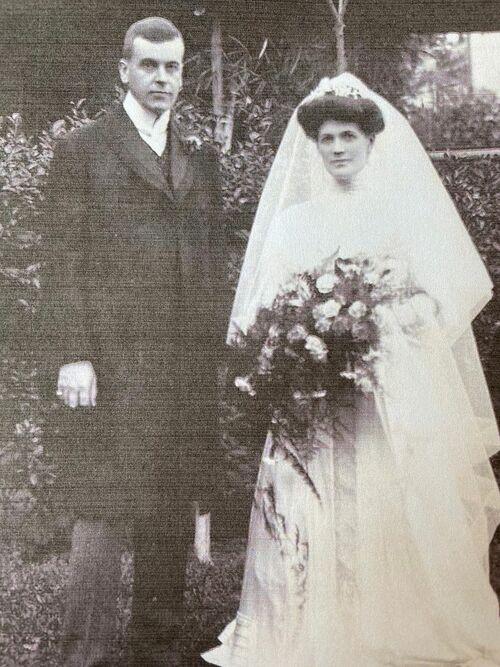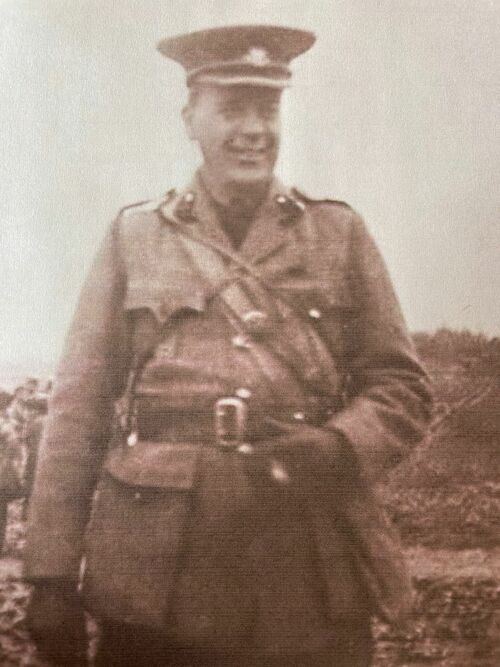Auction: 23001 - Orders, Decorations and Medals
Lot: 96
The outstanding and extremely rare Shanghai and Boxer Rebellion group of five awarded to Major H. W. Pilcher, a long-served officer - and onetime C.O. - of the Shanghai Volunteer Corps
Awarded the Chinese Order of the Excellent Crop for raising the first Chinese Company to be incorporated in the Corps, he was to remain in Shanghai for over 50 years, including the hardships of internment under the Japanese 1943-45, when he was well into his 70's
His wife died in the same period and by the time of his liberation by American forces in August 1945, he had lost 60lbs. and six inches from his waist
And yet he remained stoic throughout, on one occasion getting a cable to his brother via the Red Cross. It read:
'Am well. Don't worry. All will end well. Read 23rd and 121st Psalms. They are my help. Love. H. W. Pilcher.'
Sadly, it was not to be, and he died at the Red Cross Hospital, Shanghai on 2 April 1946
China 1900, no clasp (Serjt: H. W. Pilcher. Shanghai Vols.); Shanghai Jubilee Medal 1893 (H. W. Pilcher.); China, Republic, Order of the Golden Grain, breast Badge, silver-gilt and enamel, 57mm; Shanghai Volunteer Corps Long Service Medal, silver, with three Additional Service Bars, the reverse officially engraved, 'H. W. Piclher, Act. 1890'; Shanghai Municipal Council Emergency Medal 1937, very fine and a rare combination (5)
Henry William Pilcher was born in the state of Pernambuco in north-eastern Brazil on 26 January 1871, but was quickly embarked for the U.K., where he was baptised at St. Jude's Church, Walton, Lancashire in April of the same year. His father, who had been a merchant's clerk in Brazil, afterwards became the proprietor of cocoa rooms in Nottingham.
After leaving school, Henry Pilcher found employment with companies in Manchester and Bradford but, in 1889, he sailed for the East, where he was employed as a clerk by Welch Lewis & Co., public tea inspectors and general commission merchants in Shanghai.
Shortly after his arrival in January 1890, he joined 'A' Company of the Shanghai Volunteer Corps - the Mih-Ho-Lung Rifles - who were also volunteer firemen. Hence their motto: 'Say the Word and Down Comes Your House.'
To commemorate the 50th Anniversary of the founding of the International Settlement of Shanghai on 17 November 1893, Pilcher and some 624 others received the Municipal Council's Commemorative Silver Medal and, in April of the following year, he married Kate Woodward at the Cathedral of Holy Trinity, Shanghai. Sadly, following the birth of two daughters, Kate died.
In 1900, Pilcher served with the Shanghai Volunteer Corps during the Boxer Rebellion and was awarded the China Medal; the Medal Roll dated 12 March 1903, refers. Moreover, he was commissioned as a 2nd Lieutenant in the Corps in June 1903 and gained advancement to Captain in March 1905.
In the same year he was appointed a Commission Agent by Welch Lewis & Co. and, having then married Rebecca MacCormac in September 1907 - they had a son, William, born in 1909 - he served on the Electricity Committee of the Shanghai Municipal Council 1908-09.
Pilcher commanded 'A' Company of the Shanghai Volunteer Corps from March 1905-May 1916 and was instrumental in ensuring the full incorporation of the Chinese Company into the Corps, good work that resulted in him being awarded the Chinese Order of the Excellent Crop, 5th Class. Foreign Office correspondence with the British Legation in Peking states 'for his efficient services in the preservation of the peace (the Shanghai Volunteer Corps now includes one efficient Chinese Company).' He was granted permission to wear the award in September 1921 and it was announced in the London Gazette on 1 August 1922.
Having been promoted to Major in April 1912, he continued to serve in the Corps with distinction, as commanding officer of the infantry from May 1916-February 1920, and thrice as Second-in-Command of the Corps in the period leading up to 1923 when, in the acting rank of Lieutenant-Colonel, he briefly assumed overall command. In the interim, in 1921, he was appointed President of the Corps' British Recruiting Committee.
Pilcher finally retired from the Corps in June 1923 and remained in the rank of Major on its Retired List until 1942, when the Corps was disbanded. In the same period, he became the first recipient of the Shanghai Volunteer Corps Long Service Medal - in his case with three additional Bars - as announced in The Municipal Gazette on 4 January 1935, in addition to being awarded the Shanghai Emergency Medal in 1937.
Following his retirement from the Corps, Pilcher continued to hold assorted commercial appointments, including a stint as Secretary of Llewellyn & Co. Ltd, Wholesale and Retail Chemists based in Nanking Road, Shanghai, and the manufacturers of 'aerated waters'.
Then on stepping down from the world of commerce, he was appointed Secretary of the Columbia Country Club of Shanghai, which had been established by the American community on the Great Western Road. And he remined likewise employed until the club was taken over by the Japanese as a civilian internment camp.
Internment
Following the Emergency of 1937, Japanese troops started to surround the International Settlement in Shanghai and, in December 1941, they launched an attack, meeting little resistance.
To begin with allied nationals were permitted to move around as before, subject to having to register with the Japanese authorities and the Swiss Consulate. But that all changed in January 1943, when it was announced that allied civilians would be forcibly interned in civil assembly centres - hence the Japanese taking over Pilcher's Columbia Club, where he was held with his wife, Rebecca, in Room 21. Tragically, she died there in June 1943.
In December of the same year, Pilcher moved to the Chapei (now Zhabei) Japanese Civil Internment Centre on Chungstan Road (now Zhongshan), where, apart from occasional supplies delivered by the Red Cross, food shortages became acute. In his own account of his time in internment, Pilcher refers to the occasion when just one inadequate meal was served per day. Moreover, to add to his woes - and by now aged 72 years - he suffered a serious fall on a flight of stone steps.
And yet, such hardships aside - not to mention the loss of his wife - he remained stoic throughout, on one occasion getting a cable to his brother via the Red Cross. It read:
'Am well. Don't worry. All will end well. Read 23rd and 121st Psalms. They are my help. Love. H. W. Pilcher.'
By the time he was liberated by American forces in August 1945, he had lost 60lbs. and six inches from his waist.
He died at the Red Cross Hospital, Shanghai on 2 April 1946.
Sold with together with his Japanese cloth arm band, this numbered 'B 2371', as issued to the civilians held captive in Shanghai, old typed details of his promotions, besides a comprehensive file of research, including an excellent account of his life and times, with supporting references and documentation.
For his miniature dress medals, please see Lot 489.
Subject to 20% VAT on Buyer’s Premium. For more information please view Terms and Conditions for Buyers.
Sold for
£14,000
Starting price
£5800

